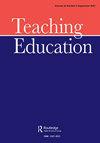Beginning teachers’ developing clinical judgement: knowledge, skills and attributes for clinical teaching
IF 1.1
Q2 EDUCATION & EDUCATIONAL RESEARCH
引用次数: 1
Abstract
ABSTRACT This paper reports on a case study that tracked a group of beginning teachers who were undertaking an employment-based model of Initial Teacher Education (ITE). This ITE program combined academic study for a Masters-level degree with part-time employment in secondary schools. The beginning teachers were concurrently engaged in face-to-face and blended learning, with substantial professional in-school experience (0.8). The focus of the study was an investigation of the development of clinical judgement and how these beginning teachers articulate the knowledge, skills and attributes required for their professional decision-making with a model of clinical teaching. Drawing on data collected using open-text questionnaires at two-time points, findings of the study indicate a strong acknowledgement of the centrality of a student centred focus by the beginning teachers. Participants’ responses indicated awareness of the importance of using data to identify learning need/s and for planning pedagogic interventions. However, there was comparatively limited evidence of beginning teachers generating data on or reflecting on the implications of their pedagogical choices to inform adjustments for future interventions. This highlights the importance of providing beginning teachers with ongoing support to build their clinical judgement and refine its application in clinical teaching.启动教师的发展性临床判断:临床教学的知识、技能和属性
摘要本文报道了一个案例研究,该研究跟踪了一组正在进行基于就业的初始教师教育(ITE)模式的初任教师。该ITE项目将硕士学位的学术学习与中学的兼职工作相结合。初任教师同时从事面对面和混合学习,具有丰富的专业在校经验(0.8)。研究的重点是调查临床判断的发展,以及这些初任教师如何通过临床教学模式阐明其专业决策所需的知识、技能和属性。根据在两个时间点使用开放式文本问卷收集的数据,研究结果表明,初任教师强烈承认以学生为中心的关注点的中心地位。与会者的答复表明,他们意识到利用数据确定学习需求和规划教学干预措施的重要性。然而,有相对有限的证据表明,初任教师生成了关于或反思其教学选择的影响的数据,以为未来干预措施的调整提供信息。这突出了为初任教师提供持续支持的重要性,以建立他们的临床判断并完善其在临床教学中的应用。
本文章由计算机程序翻译,如有差异,请以英文原文为准。
求助全文
约1分钟内获得全文
求助全文
来源期刊

Teaching Education
EDUCATION & EDUCATIONAL RESEARCH-
CiteScore
3.80
自引率
6.20%
发文量
15
期刊介绍:
Teaching Education is an interdisciplinary forum for innovative practices and research in teacher education. Submission of manuscripts from educational researchers, teacher educators and practicing teachers is encouraged. Contributions are invited which address social and cultural, practical and theoretical aspects of teacher education in university-, college-, and school-based contexts. The journal’s focus is on the challenges and possibilities of rapid social and cultural change for teacher education and, more broadly, for the transformation of education. These challenges include: the impact of new cultures and globalisation on curriculum and pedagogy; new collaborations and partnerships between universities, schools and other social service agencies; the consequences of new community and family configurations for teachers’ work; generational and cultural change in schools and teacher education institutions; new technologies and education; and the impact of higher education policy and funding on teacher education. Manuscripts addressing critical and theory-based research or scholarly reflections and debate on contemporary issues related to teacher education, will be considered. Papers should attempt to present research, innovative theoretical and/or practical insights in relevant current literature and debate.
 求助内容:
求助内容: 应助结果提醒方式:
应助结果提醒方式:


